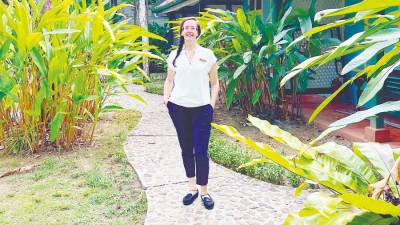KUALA LUMPUR: Temple Tree Resort in Langkawi is redefining boutique hospitality by pairing heritage preservation with a sustainability agenda.
Under the leadership of Resort Manager Irene Vairo (pic), the property has evolved from a collection of restored heritage houses into an award-winning resort recognised as Best Boutique Hotel in Asia in both 2023 and 2024.
Its strategy now extends beyond guest experience to include
long-term environmental management and community impact.
“The tree in the centre of our resort has always been the centerpiece of our design, and now it symbolises two hands together. It reflects both the legacy of this property and our ongoing commitment to sustainability,” said Vairo.
The resort’s updated logo is emblematic of the resort’s dual priorities: preserving cultural authenticity while investing in operational practices that meet modern sustainability standards.
Since its acquisition in 2019, Temple Tree has undertaken substantial capital improvements.
Landscaping and structural renovations revitalised the property, while operational upgrades strengthened resilience in critical areas such as water management.
In 2023, rainwater harvesting tanks were installed, enabling the resort to secure water supply for up to three days during dry spells.
This investment not only ensures uninterrupted guest services but also reduces strain on the island’s limited utilities.
The resort has also phased out single-use plastics. All rooms now feature refillable glass bottles, supported by in-house filtration and distribution systems.
“When I first came on board, we stopped using plastic in the rooms. As you can see, all our rooms carry a glass bottle, and we have a refill machine that is being used by the guests,” Vairo explained.
The restaurant has implemented eco-friendly straws manufactured by a Penang-based SME, reinforcing the resort’s preference for sustainable local supply chains.
Food and beverage operations integrate sustainability into sourcing and production. A hydroponic garden supplies fresh basil, mint, Brazilian spinach, and other seasonal produce directly to the kitchen, supporting a farm-to-table approach that reduces food miles.
Composting facilities are scheduled to come online this year, creating a closed-loop system that channels organic waste back into the gardens. Even coffee grounds from the bar are reused as natural fertiliser.
Future projects are also in the pipeline. The resort is evaluating the feasibility of solar panels, though structural differences between heritage houses require careful planning.
A chlorine-free pool system is under consideration, which would eliminate chemical use and allow treated water to be safely repurposed for irrigation.
“Step by step, one by one, we will implement it,” Vairo said, noting that smaller-scale properties must phase capital expenditure responsibly across investment cycles.
Temple Tree positions sustainability as a multidimensional strategy, extending beyond environmental measures to include community integration.
The resort hosts monthly pop-up markets for local vendors, directing 10% of sales to charitable causes. Partnerships include support for animal welfare initiatives and contributions to the Langkawi Charity Club, which funds local healthcare and education.
“When we’re talking about sustainability in hotels, it’s not only regarding the environment. It’s also about helping out the community,” Vairo emphasised.
These initiatives align closely with evolving customer expectations.
A growing proportion of European and Australian guests are selecting hotels based on sustainability credentials, arriving with reusable bottles, and requesting eco-conscious activities such as mangrove tours.
Sustainability now accounts for approximately 25% of Temple Tree’s marketing campaigns, reinforcing the resort’s ESG positioning in a competitive tourism market.
Financial performance has validated this approach. Occupancy has grown by 30%–40% in recent years, driven primarily by international markets.
With Visit Malaysia 2026 expected to bring a surge in arrivals due to new direct flights from Europe, the resort is preparing for expansion.
Five new suites will be added to the Ipoh House, offering a higher-end product to capture additional market share while maintaining the property’s heritage identity. The phased expansion is scheduled for completion in mid-2026.
Vairo is confident this dual focus on heritage and sustainability will strengthen Temple Tree’s competitive advantage.
“When you live on an island, sustainability isn’t a choice – it’s a necessity,” she said.
By embedding environmental practices, supporting the local economy, and preserving cultural assets, the resort is positioning itself as both a steward of Langkawi’s heritage and a forward-looking hospitality operator.
For stakeholders, Temple Tree’s trajectory demonstrates that boutique properties can achieve scalable ESG outcomes through incremental investments.
Its operational model – balancing conservation with innovation – offers a blueprint for heritage resorts seeking to remain commercially relevant while meeting rising sustainability expectations from regulators, investors, and international travellers alike.
